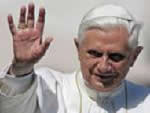|
Pope Benedict XVI- Angelus |
 Angelus Message
Angelus Message
On the Last Who Are First
"Being Called Itself Is Already the First Recompense"
H.H. Benedict XVI
September 21, 2008
www.zenit.org
Dear Brothers and Sisters,
Perhaps you remember when, on the day of my election to the
pontificate, I addressed the crowd in St. Peter's Square and I
presented myself, in an off the cuff way, as a worker in the Lord's
vineyard. Well, in today's Gospel (cf. Matthew 20:1-16a), Jesus
recounts the parable of the owner of the vineyard, who at different
hours of the day calls laborers to come work in his vineyard. And in
the evening he gives to all of them the same wage -- one denarius --
provoking the protest of the laborers who had been there from the
first hour.
It is clear that that denarius represents eternal life, a gift that
God reserves for everyone. Indeed, precisely those who are
considered "last," if they will accept it, become "first," while the
"first" can run the risk of becoming "last." The first message of
this parable is in the fact itself that the owner does not tolerate,
so to speak, unemployment: He wants everyone to work in his
vineyard. And in reality, being called itself is already the first
recompense: Being able to work in the Lord's vineyard, putting
yourself at his service, cooperating in his project, constitutes in
itself an inestimable reward, which repays all toil.
But this is understood only by those who love the Lord and his
Kingdom. Those who, instead, work solely for the pay will never
recognize the value of this priceless treasure.
St. Matthew, apostle and evangelist, is the one who reports this
parable that is read in today's liturgical feast. I would like to
emphasize that Matthew experienced this story firsthand (cf. Matthew
9:9). In fact, before Jesus called him, Matthew was employed as a
publican and for this reason was considered a public sinner by the
Jews and was excluded from "the Lord's vineyard."
But everything changes when Jesus, walking by the customs house,
looks at him and says "Follow me." Matthew got up and followed him.
From publican he immediately became a disciple of Christ. From being
"last" he finds himself as "first," thanks to the logic of God,
which -- for our good fortune! -- is different from the world's
logic.
"My thoughts are not your thoughts," the Lord says through the mouth
of the prophet Isaiah, "your ways are not my ways" (Isaiah 55:8).
St. Paul too, whose special jubilee year we are celebrating,
experienced the joy of feeling himself called by the Lord and
working in his vineyard. And how much work he did! But, as he
himself confessed, it was God's grace that worked through him, that
grace that transformed him from a persecutor of the Church into an
apostle of the Gentiles. "For me to live is Christ and to die is
gain," St. Paul says. But he immediately adds: "But if living in the
body means doing work that is fruitful, I do not know which to
choose" (Philippians 1:21-22). Paul understood well that working for
the Lord is already recompense on this earth.
The Virgin Mary, who a week ago I had the joy of venerating at
Lourdes, is the perfect vine in the Lord's vineyard. From her there
grew the blessed fruit of divine love: Jesus, Our Savior. May she
help us to respond always and with joy to the Lord's call, and to
find our happiness in the possibility of toiling for the Kingdom of
Heaven.
[After the Angelus, the Holy Father said:]
In recent weeks Caribbean countries -- Haiti, Cuba and the Dominican
Republic in particular -- and the southern United States, especially
Texas, have been hit hard by hurricanes. I would again like to
assure all of those dear people that I am remembering them in my
prayers. I hope that help will soon arrive in the areas that have
suffered the most damage. The Lord desires that, at least in these
circumstances, solidarity and fraternity prevail above all else.
This Thursday, Sept. 25, there will be a high level meeting, in the
context of the 63rd General Assembly of the United Nations, to
verify the accomplishment of the objectives established by the
"Millennium Declaration" of Sept. 8, 2000. On the occasion of this
important gathering, in which the leaders of all the countries of
the world will be together, I would like to renew the invitation to
take up and apply with courage the necessary measures to eliminate
extreme poverty, hunger and lack of education and the scourge of the
pandemics that harm the most vulnerable above all.
Such a commitment, while demanding sacrifices in these moments of
worldwide economic difficulties, will not be without important
benefits for the development of nations who are in need of help and
for the peace and well-being of the entire planet.
[Translation by Joseph G. Trabbic]
[The Pope then greeted the people in several languages. In English,
he said:]
I am happy to greet all the English-speaking pilgrims and visitors
present for this Angelus prayer. In today's Gospel, Jesus teaches
that God is always generous in his dealings with us. The Kingdom of
Heaven will come to us not as a reward for our good deeds, based on
strict justice, but as a grace, a gift of God's mercy and abounding
love. Let us ask the Lord to keep us always in his love! I wish you
all a pleasant stay in Castel Gandolfo and Rome, and a blessed
Sunday!
© Copyright 2008 - Libreria Editrice Vaticana
Look
at the One they Pierced!
This page is the work of the Servants of the Pierced Hearts of Jesus and
Mary